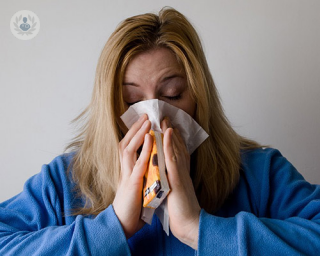Allergy
Dr Anne Mier - Pulmonology & respiratory medicine
Created on: 04-12-2017
Updated on: 09-21-2023
Edited by: Carlota Pano
What is an allergy?
An allergy is a reaction of the immune system to exposure to a substance in the environment which is usually harmless for most people. Examples include:
- Pollen
- Certain foods, e.g. peanuts
- Certain drugs
- Dust mites
- Contact with certain substances, e.g. latex, nickel
- Insect stings
Allergies can affect several parts of the body. However, the most frequently affected areas are the nose, the eyes, the respiratory tract and the skin.

What are the symptoms of an allergy?
Given that there are many types of allergies, there are various possible symptoms. The symptoms of an allergy can range from mild to severe. Common symptoms associated with allergies include:
- Blocked nose
- Sneezing
- Swollen, watery eyes
- An itching sensation in your nose, mouth, throat and lips
- A rash, often red and itchy
- Coughing
- Wheezing and the worsening of symptoms of asthma
- Worsening of eczema symptoms
More extreme allergic reactions can cause anaphylaxis or anaphylactic shock, in which the mouth and throat may swell, the patient may struggle to breathe, feel lightheaded, and may even lose consciousness. Anaphylaxis is highly dangerous and can be fatal if not treated immediately.
How are allergies diagnosed?
If you're displaying symptoms of an allergic reaction, tell your doctor about the symptoms, when and how often they occur, and if you have noticed anything that seems to trigger them. This may be sufficient for your doctor to diagnose the allergy, and perhaps offer treatment and/or advice on dealing with the allergy.
If the allergy is severe, or it is not clear what is causing the reactions, you may be referred to a specialist clinic for tests, such as:
- Skin prick testing – This involves placing a drop of liquid containing the allergen the doctor suspects you're allergic to onto your forearm, which is then gently pricked with a needle. If you're allergic to the substance, the test will cause an itchy, red bump to appear within 15 minutes.
- Patch test – Adhesive patches, usually treated with a small amount of the suspected allergen are applied to the skin. The patch test is often used to diagnose contact dermatitis, a type of eczema.
- Radioallergosorbent test (RAST) – This blood test looks at the levels of allergy antibodies (IgE) present in the blood when it's combined with a series of allergens. It tests to see if there is a 'true' allergic reaction.
What causes an allergy?
Allergies are thought to be caused by a genetic predisposition, as a family history of allergies makes a patient much more likely to also have an allergy. Allergies are an overreaction of the immune system, which produces antibodies to defend the body against harmless substances, as if they were a threat. This immune reaction can inflame the skin, airways, or digestive system.
How can allergic reactions be prevented?
The only way to avoid an allergic reaction is to avoid contact with the allergen. However, this can be difficult for certain allergens, such as pollen, which is released into the air by plants on a seasonal basis. Similarly, food allergies can cause problems, as small amounts of allergens, such as peanuts, can be found in many foods.
How are allergies treated?
Based on the type and severity of the allergy, there are several treatment options. One of the most common treatments is antihistamines, which are used for pollen or specific plant allergies.
Anaphylaxis can be treated with adrenaline, and patients with known extreme allergies often carry an auto-injector for this reason. If you are with someone who goes into anaphylactic shock, you should:
- call an ambulance;
- lie them down flat;
- remove the trigger if possible, and;
- if you know how, help them with their adrenaline auto-injector.
Which doctor should I talk to?
To get an accurate diagnosis and get started on a treatment, you should see an allergist or a pulmonary and respiratory specialist.
















